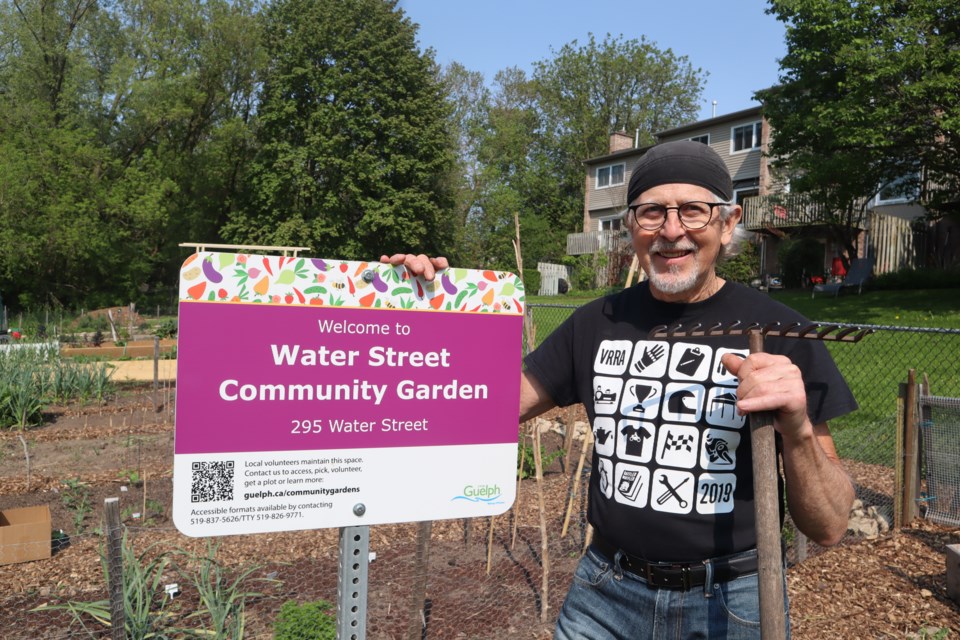The first community gardens on city property and school board property started in 2010 and was four gardens being tended to by 80 gardeners and volunteers.
This year the program will see 735 people planting, weeding and growing things at 350 plots on 45 community gardens,
It was community interest which convinced the City of Guelph to start community garden pilot projects. Garden locations were chosen based on community socio-economic needs and interest.
In 2015 the city formalized the community garden program and policy.
Participation in community gardens has increased by seven per cent since 2021, according to the 2022 Community Garden Survey Results.
The results came from 93 gardeners from 14 different gardens and included 17 garden coordinators.
Paddy Fitzgerald started the community vegetable garden called Water Street Park Community Garden.
He grew up in a farming community in Ireland and when he moved to Canada 40 years ago his passion for gardening continued. He had a plot at the Ignatius Jesuit Centre. Then Fitzgerald had a property in Mount Forest and spent his time gardening there.
He sold the property and while living in Guelph at Village on the Green the condo complex didn’t allow for gardens to be planted. Five years ago he put in an application to start a garden at Water Street Park.
The garden started off with 10 plots and has since grown to 14 plots.
The garden didn’t go off without a hitch. To get water for the garden they couldn’t use the water from the condo complex. There is a river nearby and the city brought barrels for the gardeners.
Fitzgerald bought a water pump and a 150 feet hose. The suction pump would collect the water from the river and it would flow into the barrels. It’s easier than scooping the water with buckets which is what they did previously.
At one point the garden had moles living along the edge and they would take bites out of the vegetables.
The garden lines up in front of a fence separating the park from the condo's backyard. People in the condos didn’t like it at first but now most of them compliment the garden, said Fitzgerald.
The second planting season the garden had a waitlist. Now with 14 plots they are all spoken for and there is a waitlist of about 16 people.
“We’re kind of disappointed that some of the people let the produce die on the vine and that’s not the intent,” said Fitzgerald. There is a community box so unused produce can be donated.
Fitzgerald estimated from each of the 14 plots they produce 75 to 100 pounds of produce.
“I have 50 garlic cloves those now will last me right through all year,” he said. It isn’t about not having to buy so much from store but knowing the produce he harvests is organic.
It’s nice to be social and share knowledge with the other gardeners, said Fitzgerald. There are people who haven’t gardened before and will ask questions about when and how to plant.
Some of the growing interest in the gardens could be the rising cost of living, said Samantha Dupré, community stewardship coordinator of forestry and sustainable landscapes, parks for the City of Guelph.
“Not that community gardens are going to solve everyone's problems but there is a real benefit to having affordable, healthy organic food just around the corner,” said Dupré.
There are plants around the outside of the garden to attract pollinators. There has been a growing interest in orchards and pollinator gardens.
“Especially with the pollinator gardens and the orchards is that we’re needing desperately to have more habitat for pollinators because there is a decline worldwide but also in North America for habitat for native insects,” said Dupré.
There will be one new garden this year called the Eramosa River Park Food Forest. It will be located at Eramosa River Park and it is a hybrid garden, a mix of fruit trees, shrubs, and herbs.
These gardens don’t require the same amount of water access than the traditional vegetable gardens do.
“There has been a record number of people interested in that garden,” said Samantha Dupré.
There were 238 survey responses and 92 per cent of respondents supported a community orchard in Eramosa River Park.
Roughly 40 people express interest each time a new garden is presented.
Garden coordinators have expressed the need for more gardens at almost every meeting, said Dupré.
The north and south ends of the city seem to have a need for more traditional vegetable community gardens, said Dupré.
The existing community garden is expanding at St. George’s Park. It will double in size.
Traditional vegetable community gardens occupy most of the 45 gardens in the city.
Out of the 45 gardens, 24 are on City of Guelph property and 21 are on other properties such as school board and church properties.
There are four orchards, 11 pollinator gardens and 10 hybrid gardens.
As of spring 2023 nearly all of the community gardens are reported as full and have waitlists for plots.
In 2022, 70 per cent of the community garden coordinators reported they had waitlists for plots and the average waitlist was 10.
“One of the things that the community gardens members say is just how good it is for their mental health or their social health. Especially given all the stresses of the pandemic the last couple of years,” said Dupré.
“And that’s given them opportunities to connect with their neighbours. Make intergenerational connections or connections with new Canadians because a garden is a space that all people come together,” she said.
